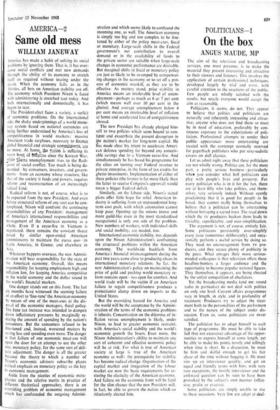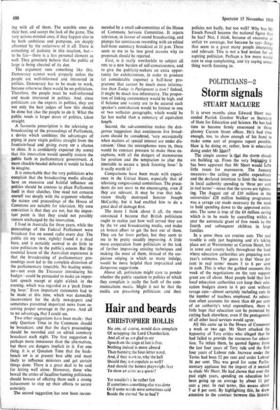On the box
POLITICIANS-1
ANGUS MAUDE, MP
The aim of the television and broadcasting services, one must presume, is to make the material they present interesting and attractive to their viewers and listeners. This involves the application of certain professional techniques,
developed largely by trial and error, with careful attention to the reactions of the public. Few people are wholly satisfied with the results, but nearly everyone would accept the aim as reasonable.
Politicians, it seems, do not. They appear to believe that politics and politicians are
naturally and inherently interesting and attrac- tive; anyone who does not find them so must be in need of education, preferably by con- tinuous exposure to the exhortations of poli- ticians. Professional attempts to render their public appearances more entertaining are treated with the contempt normally reserved for paperback publishers who put sexy-sadistic covers on dull classics.
Let us admit right away that these politicians are not wholly wrong. Politics are, for the most
part, a pretty serious business—particularly
when you consider what hell politicians can play with people's lives and property. For every politician who is in it for the fun, there are at least fifty who take politics, and then!- selves, very seriously indeed. Without openly proclaiming that it is good for people to be bored, they cannot really bring themselves to believe that a politician can be entertaining without betraying a sacred trust. The road down which the TV producers beckon them leads to triviality, superficiality, and over-simplification.
The argument is not, of course, entirely fair. Some politicians persistently over-simplify every issue (sometimes deliberately), and occa- sionally perform a useful service by doing so. They need no encouragement from TV pro- ducers, and they secure plenty of publicity in the press. What enrages their more serious- minded colleagues is that television offers these headline-hunters a larger audience and the opportunity to become popular national figures. They themselves, it appears, are being cheated by the unfair competition of charlatans.
Yet the broadcasting media (and BBC sound radio in particular) do not deal with politics on only one level. Current affairs programmes vary in length, in style, and in profundity of treatment. Producers try to adjust the treat- ment both to the personalities of the performers and to the nature of the subject under dis- cussion. Even so, some politicians are never satisfied.
The politician has to adapt himself to each type of programme. He must be able to take full (but not excessive) advantage of the oppor- tunities to express himself at some length, yet be able to make his points tersely and tellingly when time is short. In a discussion, he must be firm and skilful enough to get his fair share of the time without hogging it. He must size up an interviewer quickly, and get on equal and friendly terms with him; with very rare exceptions, the hostile interviewer and the awkward question can be seen to have been provoked by the subject's own manner (offen- sive, prolix or evasive).
Some politicians are simply unable to rise to these occasions. Very few are adept at deal- ing with all of them. The sensible ones do their best, and accept the luck of the game. The very serious-minded ones, if they happen also to be both ambitious and pompous, are deeply affronted by the unfairness of it all. There is something of jealousy in this reaction, but— to be fair—there is a less personal element as well. They genuinely believe that the public at large is being cheated of its due.
The argument runs something like this. Democracy cannot work properly unless the people are well-informed and interested in politics. Democracy has to be made to work, because otherwise there would be no politicians. Therefore, the people must be well-informed and made interested in politics. And, since politicians are the experts in politics, they are not only the best judges of how this should be done but also the people to do it. What the public needs is larger doses of politics, taken straight.
A favourite prescription is the televising or broadcasting of the proceedings of ParliaMent, a device which combines the advantages of piping in pure virgin politics straight from the fountain-head and giving every MP a chance to shine. It is confidently expected (by some) that this innovation would speedily restore the public faith in parliamentary government. A More chuckle-headed delusion it would be hard to imagine.
It is remarkable that the very politicians who complain that the broadcasting media already have an excessive and baleful influence on politics should be anxious to place Parliament itself in their clutches. One need not concern oneself too deeply with the argument whether the nature and proceedings of the House of Commons are suitable for television. My own conviction is that they are not, but the impor- tant point is that they could not possibly remain unchanged by the innovation.
I lived in Australia for three years, while the proceedings of the Federal Parliament were broadcast live on sound radio every day. The public (in my view, rightly) found it a dead bore, and it certainly seemed to do little to raise politicians in the public's esteem. But the essential lesson of the Australian experience is that the broadcasting of parliamentary pro- ceedings soon led to the complete distortion of the parliamentary timetable. No leading minis- ter—not even the Treasurer introducing his budget—could be persuaded to make an impor- tant speech except at eight o'clock in the evening, which was regarded as a 'peak listen- ing hour.' Even important statements had to be made at this time, which was damnably inconvenient for the daily newspapers and sometimes prevented important news from re- ceiving proper coverage in the press. And all to no advantage. that I could see.
Two other suggestions have been made : that only Question Time in the Commons should be broadcast; and that the day's proceedings should be recorded and an edited summary broadcast each night. The first suggestion is perhaps more innocuous than the alternatives, but there are dangers implicit in it. For one thing, it is at Question Time that the back- bench MP is at present best able and most likely to influence ministers and get pertain things done. There is a great deal to be said for letting well alone. Moreover, those who bewail the antics of headline-hunting politicians should beware of offering them such a strong inducement to step up their efforts to secure notoriety.
The second suggestion. has now been recom-
mended by a small sub-committee of the House of Commons Services Committee. It rejects television, in favour of sound broadcasting, and plumps for continuous recording with an edited half-hour summary broadcast at 11 p.m. There seem to me to be two good reasons why its proposals should be rejected.
First, is it really worthwhile to subject all Mrs to a new burden of self-consciousness, and to give the publicity-seekers an extra oppor- tunity for exhibitionism, in order to produce (at considerable expense) a half-hour pro- gramme that cannot be much more informa- tive than Today in Parliament is now? Indeed, it might be much less informative. The propor- tion of linking commentary would be high, and if balance and variety are to be secured each speaker's contribution would be limited to one or two verbatim paragraphs, which would be far less useful than a summary of equivalent length.
Second, the sub-committee makes the dan- gerous suggestion that continuous live broad- casts should be considered, `very occasionally when matters of special interest are under dis- cussion.' Once ,the microphones were in, there would be constant pressure to make these ex- ceptions, with all the dangers of manoeuvres for position and the temptation to alter the timetable to secure a 'peak listening hour.' Is it really worth it?
Comparisons have been made with experi- ence in the United States, especially that of televising congressional committees. The prece- dents do not seem to me encouraging, even if they are relevant. It may be true that tele- vision finally destroyed Senator Joseph McCarthy, but it had enabled him to do a great deal of damage first.
The more I think about it all, the more convinced I become that British politicians ought to realise just how well served they are by the TV and broadcasting media, and make an honest effort to get the best out of them. They are far from perfect, but they seem to me to be pretty steadily improving. A little more cooperation from politicians in the task of further improving existing techniques and making the most of them, instead of the sus- picious sniping in which so many indulge, would be more helpful than impractical and dangerous suggestions.
Above all, politicians might care to ponder whether the public reaction to politics of which they complain is really the fault of the com- munications media. Might it not be that the media are presenting politicians and their
policies not badly, but too well? Why has Mr Enoch Powell become the national figure that he has? Not, I think, because of excessive or unfair ry coverage, but because he says things that seem to a great many people interesting and relevant. This is not a bad notion for an aspiring politician. Perhaps a few more would care to stop complaining, and try saying some- thing worth listening to.







































 Previous page
Previous page